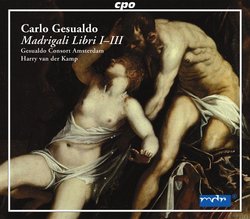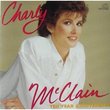| All Artists: Carlo Gesualdo, Harry van der Kamp, Gesualdo Consort, Alexander Weimann, Alexander Weinmann, Nele Gramß Title: Carlo Gesualdo: Madrigali Libri I-III Members Wishing: 0 Total Copies: 0 Label: Cpo Records Original Release Date: 1/1/2005 Re-Release Date: 9/20/2005 Genres: Pop, Soundtracks, Classical Styles: Vocal Pop, Opera & Classical Vocal, Chamber Music, Historical Periods, Classical (c.1770-1830) Number of Discs: 2 SwapaCD Credits: 2 UPCs: 761203713820, 076120371382 |
Search - Carlo Gesualdo, Harry van der Kamp, Gesualdo Consort :: Carlo Gesualdo: Madrigali Libri I-III
 | Carlo Gesualdo, Harry van der Kamp, Gesualdo Consort Carlo Gesualdo: Madrigali Libri I-III Genres: Pop, Soundtracks, Classical |
Larger Image |
CD DetailsSimilar CDs
|
CD ReviewsBeautiful perfomances of exsquisite madrigals Stephen Gilbert | Seattle | 10/01/2005 (5 out of 5 stars) "The first 3 books of Gesualdo's madrigals don't have the startling chromaticism and the violent rhythmic contrasts of the 5th and 6th books, but they're rich pieces nonetheless and here and there are hints of the over the top imagination of the later works. These performances are characterized by accurate intonation and lovely timbre. This is one of my favorite recordings of Italian madrigals. " Every Two or Three Minute Madrigal .... Giordano Bruno | Wherever I am, I am. | 05/22/2010 (5 out of 5 stars) "... by Carlo Gesualdo is a miracle, a summation of the art of polyphony that had evolved in Europe over the generations from de Vitry and Machaut in 14th C France, through the Franco-Flemish masters, to Cipriano and Willaert, to the harmonically eccentric madrigalists in Ferrara, Marenzio especially, who stimulated Don Carlo's explosion of creativity far more than his second bride. For all his reputation as an avant-gardish prophet of modernity, Gesualdo was in fact staunchly conservative in his musical structures. He was a polyphonist at the very moment when polyphony was losing its appeal, becoming "old hat" (that's English for 'Prima Prattica') in comparison to the passionate monody that would become the foundation of the Baroque. Gesualdo never showed much interest in the 'Seconda Prattica' expounded most famously by Claudio Monteverdi. "Basso continuo", you might say, was not his bag. His passionate chromaticism was certainly put at the service of the poetry he set to music, but it was his goal, not to render the text intelligibly paramount, but to depict in pure sound, in five-part polyphony, the emotions expressed in the words. Make the comparison for yourself: listen to a text by Petrarch set by Gesualdo and by the equally passionate monodists Sigismundo d'India or Michelangelo Rossi; I guarantee that you'll find the words far harder to follow in the former than the latter. But on the other hand, five skilled vocalists could sing a Gesualdo madrigal using solfeggio syllables and still convey all the emotion of the poem through the music.
Gesualdo's conservatism was what sent his music into oblivion for centuries, not its eccentricity. And it was his bold chromaticism, his dissonance if you will, that first attracted the attention of 20th C composers and performers. In the long run, however, it is his mastery of polyphony that makes his music so great, and the best performances of his works are those that display the most musical understanding of polyphonic singing. This 2-CD recording of Gesualdo's first three books of madrigals is such a performance. It's driven by the perfect balance of 'togetherness' (ensemble) and independence. Each line declaims its musical content according to its own rhetoric; each line invites the listener's rapt attention. You have to learn to hear polyphony, to be able to attend to five eager voices all 'talking' at once, and of course the only way to learn is by hearing. In a sense, Gesualdo's first three books of madrigals amount to a manual of lessons in the art of hearing, as they progress in flamboyance from the relatively straightforward Apollonian style of the first book to the ear-popping Dionysian originality of the third. It's the Third Book, certainly, that will make your hair stand on end. Harry van der Kamp and his 'Gesualdo Consort Amsterdam' execute that progression wonderfully; if they sound more reserved on the first CD (Book 1) than other ensembles, that reserve is appropriate and sets the listener up for the intensity of their singing on the second CD. Don't hesitate because you may already have another recording of Gesualdo by this or that ensemble. No two highly skilled performances of these madrigals will ever sound alike, though all semi-skilled performances sound exactly the same. Van der Kamp is best known as the basso on dozens of recordings of Bach and Telemann, but for this recording he has assembled a consort not of choristers but of topnotch soloists -- the sopranos, for instance, are Monika Mauch and Constanze Backes -- the sort of singers who can 'hold their own' in polyphony, making each line independently expressive." |

